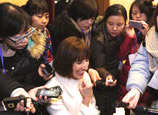
MUNICH, Germany, Feb. 3 (Xinhua) -- Six major countries would hold new talks with Iran on its disputed nuclear program in Kazakhstan on Feb. 25, Iranian Foreign Minister Ali-Akbar Salehi said here on Sunday.
"I have good news. I heard yesterday that P5+1 or EU3+3 will be meeting in Kazakhstan on Feb. 25 (on Iran's nuclear program)," Salehi said during the ongoing Munich Security Conference.
Meanwhile according to media reports, the six major countries have put forward a proposal to hold a new round of nuclear talks with Iran in late February in Kazakhstan, a spokesman for European Union (EU) foreign policy chief Catherine Ashton confirmed on Sunday.
The EU side, on behalf of the United States, Russia, China, France, Britain and Germany, is waiting for confirmation of the Iranian side on the date and venue, according to media reports quoting the spokesman.
"We have never pulled back from the EU 3+3 negotiations," Salehi said.
The minister stressed that Iran had always insisted that let the negotiation continue until a mutually accepted or satisfactory resolution is reached. "But then it was not us who stepped back," he added.
Salehi also pinned hopes on the two packages, "one package from Iran with five steps and the other package from the EU 3+3 with three steps."
The Iranian foreign minister also said he took with "positive consideration" U.S. proposal to hold direct talks with Iran.
Salehi took note of the remarks made by U.S. officials here and said, "We take these statements with positive consideration. I think this is a step forward."
Nonetheless, Salehi also complained about the lack of heed from the other side to the commitment during the past negotiations.
U.S. Vice President Joe Biden on Saturday told diplomats and defense officials here that the U.S. offer for bilateral talks with Iran on its nuclear program was still valid.
"There is still time, there is still space for diplomacy, backed by pressure, to succeed," Biden said.
"The ball is in the government of Iran's court. And it's well past time for Tehran to adopt a serious, good faith approach to negotiations with the P5+1,"he said.
Salehi spoke of the past experience of bilateral talks between Iran and the United States and emphasized, "we have to make sure this time, and this is very fair of us, to make sure that the other side this time comes with authentic intention, with the fair and real intention to resolve the issue. "
Salehi considered it contradictory to offer bilateral talks and make threatening rhetoric at the same time.
"It there is an honest intention on the other side, then we will take that into serious consideration," he said.
Salehi blasted the accusations that Iran was pursuing military use of its nuclear program, saying that they were groundless.
Salehi clarified that Tehran does not look for confrontation. "We think that it is only apt, appropriate and wise to change enemies into friends, and not vice verse, to change friends into enemies," he said.
"We are a nation, as I said, which has produced civilization ... We are a rational nation. We are a wise nation," said Salehi.
Salehi saw security as a collective issue. "It can not be divisible, we can not divide security," he said.
Commenting on the development of the region he came from, Salehi said the happenings in the region, once out of control, will have an impact on the international community.
With regard to the role of Iran in the region, Salehi said it is an important regional player "whether we like it or not, whether anybody recognizes it or not."
"We are a regional player, and I would like to say we are the golden key to the region," he said.
















 High-profile divorce saga ends
High-profile divorce saga ends


![]()
